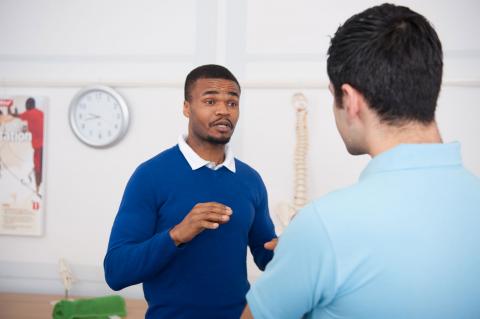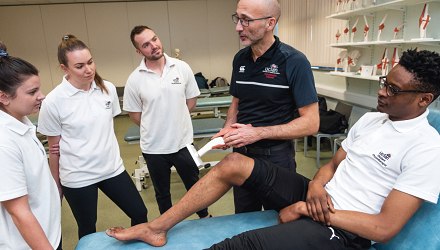The terms consultant and advanced practice are used to denote a level of practice that registered healthcare professionals from a range of professional backgrounds and areas can achieve by fully meeting the four elements of practice: clinical, leadership, education and research.

I think you have to be motivated and willing to negotiate with your manager and team that all four pillars of practice are important and need to be developed.
Below are links to CSP pages and other useful resources to help you think about how you can meet the 4 pillars of advanced and consultant practice. There are also further details of the 4 pillars in the advanced practice frameworks for each UK country and on the HEE e-learning for health ACP toolkit
Please also have a look at the case studies of members in advanced practice and consultant roles.
Clinical
- Developing advanced clinical skills will cover a range of areas depending on your scope of practice and where you work. There are many sources of learning including taught university modules and Advanced practice master’s degrees as well as online learning. Clinical skills can also be developed through supervision and mentoring, reflective practice and peer observation and learning.
- Many clinical specialities have also developed specific career frameworks for their areas such as the mental health framework in England.
Key areas for clinical skills development may include:
- Public health and health promotion skills
- Shared decision making and personalised care
- Advanced communication and motivational interviewing
- Safeguarding, mental and physical health assessments
- Consultation and clinical decision making skills
- Interventions which may include rehabilitation, non-medical prescribing or injection therapy skills as part of your development.
Leadership
Leading yourself and others is core to consultant and advanced level practice. Consultant and advanced practitioners should be integral in transforming and leading quality person-centred care by ‘looking up and out’ across practice, service and professional boundaries to identify and share good practice. Consultant and advanced practitioners should display team leadership, resilience, and determination in managing often complex and unpredictable situations.
Consultant and advanced practitioners can seek to develop effective leadership skills through formal courses, educational routes, reflective practice, mentorship and coaching . Many resources and programmes are available to support leadership development and networking such as:
- NHS horizons
- School for change agents
- NHS leadership academy
- CSP leadership development programme
- Social media
Equality, Diversity and Inclusion
Diversity in leadership roles at consultant and advanced level needs to increase. Several reports have set out the challenges for this to happen:
- NHS England: CNO Black and Minority Ethnic (BME) Leadership
- King's Fund: equality and diversity
- NHS Confederation: BME leadership network
Consultant and advanced practitioners should actively seek to promote diversity and inclusion across the workforce and within their practice through strong role modelling and leadership. As all practitioners should, they should act to challenge racism and discriminatory practice in the workplace, acting as a role model for others and removing barriers to increased diversity and inclusion.
Research
The research pillar is not just about undertaking research. it also covers:
- The critical appraisal and utilisation of research in your practice
- Evaluation of practice and service delivery
- Monitoring impact local, regionally, nationally and internationally
As an consultant or advanced practitioner you should be committed to embedding a research culture across health and social care. You may be actively involved in leading research or data collection and supporting individuals to engage and participate in research within strong ethical frameworks. Clinical audit, service redesign and quality improvement will all contribute to your evaluation of the impact and areas for development and transformation.
- NHS improvement hub
- National Institute for Health Research
- Council for Allied Health Professions Research
- HEE Clinical academic careers
- CSP innovation database
Education
Lifelong Learning is a core of all physiotherapy practice. Consultant and advanced practice roles make a valuable and essential contribution to the education of both themselves and to others. They should advocate for and contribute to culture of organisational learning to inspire existing and future staff. This might include clinical teaching of pre- and post-registration students, professional colleagues or lecturing in universities or formal learning courses.
Own learning
All physiotherapists should have a commitment to continuing professional development and lifelong learning. It is important to regularly review your own learning and development needs to ensure that they reflect all four pillars of advanced practice. The CSP virtual learning environment and portfolio provide resources to support reflective learning.
Having a mentor and being a mentor for others are both powerful learning tools. The CSP mentoring platform enables you to do both.
Pre-registration students
Pre-registration students are our future workforce and need to develop a broad base of skills, knowledge and behaviours. They also need to observe inspirational role models on which to shape their future career pathways. No practitioner is too specialist to support pre-registration students and a team approach is encouraged where pre-registrations students are embedded within teams and are supported by all team members. Consultant and advanced practitioners are ideally placed to shape and transform placements that have workforce development and learning at their core. Examples of advanced practitioners supporting students can be seen in the following case studies.
Advanced practitioners supporting students
Advanced practitioners supporting students - Student view
Consultant practitioners supporting students - Leadership placement
See our Practice-based learning pages for more information.
Why not be an ambassador presenting at schools to inspire future AHPs and physiotherapists? Sign up at https://www.inspiringthefuture.org/
Post-registration education
Opportunities should be sought to teaching of post-registration specialist and trainee advanced practitioners and this can take many forms including clinical teaching sessions and support with Higher education institutions (HEI) assessment processes. Try contacting your local HEI to discuss teaching opportunities on relevant advanced practice or level 7 modules.
Supporting service users
As consultant and advanced practitioners you also have a role in educating your patients and service users, improving health literacy and empowering individuals to participate in their own health care.

